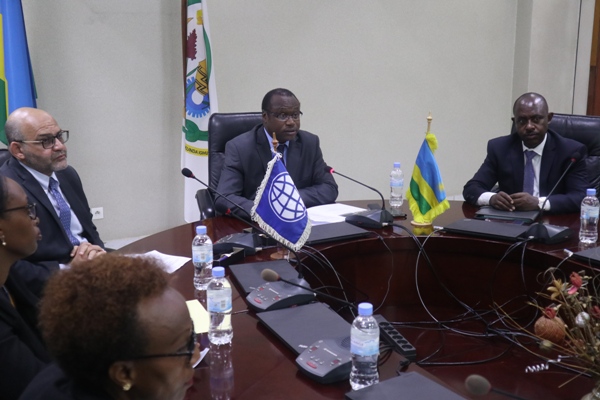
Left to right: Yasser El-Gammal, the World Bank Country Manager; Dr. Uzziel Ndagijimana, the Minister of Finance and Economic Planning; and Dr Eugène Mutimura, the Minister of Education
Kigali: The Government of Rwanda and the World Bank today signed a US $200 million (Approximately Frw 180 Billion) credit financing agreement to support Rwanda’s quality basic education for the human capital development project. Dr. Uzziel Ndagijimana, the Minister of Finance and Economic Planning and Yasser El-Gammal the World Bank Country Manager signed the agreement.
The main objective of the project is to improve teacher competency and student retention and learning.
The project consists of three main components which include:
1. Enhancing teacher effectiveness for improved student learning: Through improving teachers’ English language proficiency and digital skills, support professional development of math and science teachers in upper primary through lower secondary schools;
2. Reducing overcrowding and distance to schools: This project will finance the construction of 11,000 furnished classrooms and approximately 14,680 latrines, which is 50 percent of the required school infrastructure;
3.Strengthening institutional capacity to support teaching and learning.
Minister Uzziel Ndagijimana noted that the project is consistent with the education sector strategic Plan (2018–2024) that gives priority to improvements in learning outcomes and completion rates for basic education.
“Rwanda intends to become a knowledge based economy and to achieve this objective, a strong human capital base is critical,” Minister Uzziel said.
“Without a supportive school environment that includes an adequate number of classrooms and latrines, Rwandan students are limited in the amount they are able to learn. The dedicated efforts of the Government of Rwanda with support from many partners contribute towards student learning,” said Yasser El-Gammal the World Bank Country Manager in Rwanda.
The World Bank has a prior history of engagement in the education sector in Rwanda, but the proposed project will mark its first comprehensive support for basic education. This program will benefit from the recent 2018 World Development Report on Education, which provides insights for improving the delivery of education services in challenging contexts. (End)
